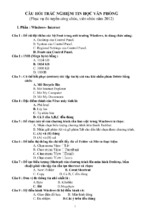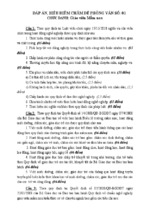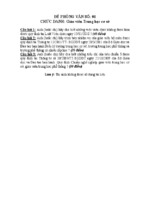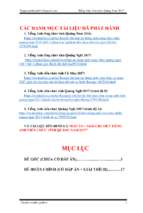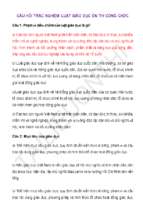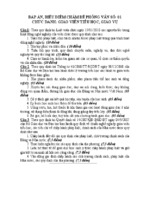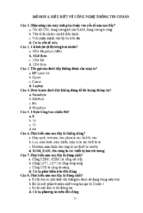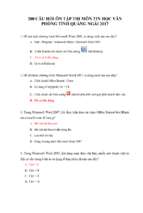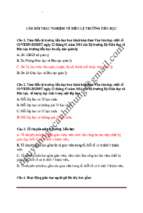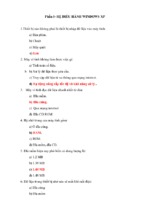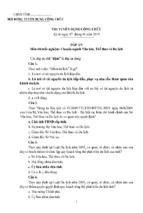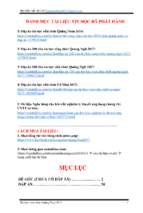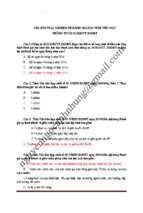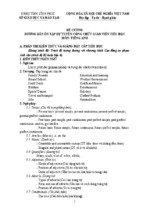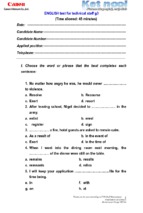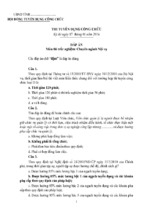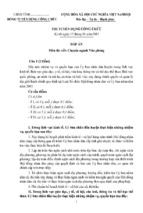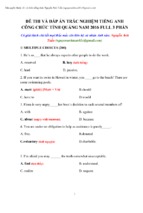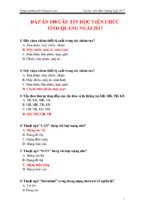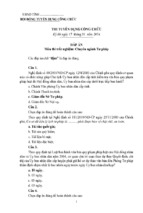Mô tả:
BÀI ÔN TẬP TRÌNH ĐỘ B - SỐ 10
PAPER 1: READING COMPREHENSION
Section A : Choose the word or phrase which best completes each sentence. Circle your choice.
1. What vegetables would you like?
___________, please
a. peaches and carrots
c. tomatoes and pears
b. peas and potatoes
d. beans and apples
2. He drew all his money ___________blank before he left.
a. of
b. off
c. out of
d. to
3. As the car is small, it’s much more ___________on petrol.
a. expensive
b. poor
c. economical
d. economic
4. You’ll get a better ___________of exchange of a bank.
a. rate
b. value
c. worth
d. charge
5. I’ve got time for a very quick ___________before I go.
a. snack
b. barbecue
c. feast
d. picnic
6. I’m not really ___________this king of music. I prefer music you can dance to.
a. in
b. for
c. into
d. with
7. She’s ___________with the idea that somebody is following her. I think she ought to see a
psychiatrist.
a. enthusiastic
b. fascinated
c. obsessed
d. fanatical
8. It was a very ___________evening. Nothing really happened.
a. full
b. fed up
c. disinterested
d. bored
9. Many young children have a(n) ___________with fire.
a. interest
b. obsession
c. fascination
d. enthusiasm
10. He’s a really ___________person. He talks all the time but he never says anything interesting.
a. bored
b. boring
c. fed up
d. annoyed up
11. She’s still very bitter ___________ what happened.
a. about
b. with
c. of
d. for
12. He put salt in her coffee to ___________her.
a. revenge
b. begrudge
c. retaliate
d. spite
13. Any employee who has a complaint or ___________should take the matter to his or her
manager.
a. restaurant
b. bitterness
c. grievance
d. revenge
14. He slapped me and I ___________ by the kicking him.
a. revenged
b. avenged
c. retaliate
d. resented
15. She gets ___________ if her husband goes out with other women.
a. envious
b. resentful
c. jealous
d. bitter
16. Have you ever considered ___________ jobs?
a. change
b. changed
c. changing
d. to change
17. That’s ___________ story I have ever heard.
a. a ridiculous
b. the ridiculous
c. the more ridiculous d. the most ridiculous
18. What are you doing? I ___________ on this report all morning.
a. ‘m working
b. ‘ve been working c. ‘ve worked
d. worked
19. One day last March, I ___________ a very strange letter.
a. did get
b. got
c. used to get
d. was getting
20. You ___________ forget to pay your taxes.
a. don’t have to
b. have to
c. must
d. must not
1
SECTION B: In this section you fill find after reading passage a number of questions or
unfinished statements about the passage, each with suggested answers or ways of finishing, you
must choose the one which you thick suits best
Walt Whitman, born in New York, in 1891, was one of America’s unusual literary figures.
As an individualist, he rambled through the countryside seeing people and places, and making
them his own. His experiences in earning a living were varied; at times he was a printer, a
teacher, a carpenter, nurse and newspaper editor. He was a big-hearted man, open and accepting.
He gave freely of his time by caring for the wounded during the Civil War. Though he lived in
the city, he often spent time in the country, developing his strong sense of nature, which carried
through to his poems. In 1855 he collected the verses he had written, and published them in one
thin volume, “Leaves of Grass”, a book which he revised and rewrote all the rest of his life. The
book was ridiculed by some poets and generally ignored by others, probably because his verse
forms were not traditional. He had felt that it was necessary to achieve a new poetic form in order
to communicate his views. His reputation didn’t grow until after his death, and it reached a high
point in the 1920s. Since then, Whitman’s style has greatly influenced modem poets.
21. The best title for this passage is
A. Leaves of Grass
C. Walt Whitman
B. A Country Man
D. Poetry: A New Form
22. Whitman’s big-heartedness is shown by his
A. visiting the countryside
C. rewriting “Leaves of Grass”
B. being an individualist
D. caring for the wounded
23. The passage says that during Whitman’s life time, other poets
A. accept him
C. Praised him
B. communicated with him
D. laughed
24. We can assume that Whitman was ignored because he
A. wrote in a new form
C. published his poems
B. rambled through the countryside D. rewrote his book
25. The world “rambled” is most similar the meaning of
A. stopped briefly B. walked slowly
C. traveled quickly D. marched excitedly
PAPER 2: USE OF ENGLISH AND WRITING
Section A: Fill each of the numbered blanks in the following passage one suitable word:
When I was at university, drama was considered to be part of literature. We (26) ……………...
sixteenth-century drama, such as (27)……………... plays of Shakespeare, in the same way as
poetry. (28)……………... the opening of drama departments in many universities changed all
that. University lectures began to recognize (29)……………... the dramatic art need to be
understood in the context of the theatre because the play we see on the (30)……………... is not
the same as the play we imagine (31)……………... we read it at home. Poets only need readers
(32)……………... communicate their meaning, but dramatists require the help of (33)
……………..., directors and the audience in the theatre to understand the real effect of their
work. Of course, the change I am referring to has not taken (34)……………... without
controversy. The greatest plays in English (35)……………... are often interpreted nowadays by
directors (36)……………... the way that seem like sacrilege to us. But it is essential to (37)
……………... that drama is action (38)……………... well as words, and so the words we read in
a book are not the only (39)……………... we need to take into consideration in judging a (40)
……………...
2
Section B: Make all changes and additions necessary to produce complete sentences from
following sets of words and phrases.
Example: I / wonder / why you / not / reply / last letter
Answer: I was wondering why you had not replied to my last letter
41. During / time / I / be responsible / three-year-old boy / his mother be / work
………………………………………………………………………………………………
42. I enjoyed visit / museum / eat / excellent restaurants there
………………………………………………………………………………………………
43. Our new house / be near / where / you live / so we hope / see more often
………………………………………………………………………………………………
44. I decide / stop and lunch for I was / feel / hungry
………………………………………………………………………………………………
45. Which / more / difficult to bear / heat of summer / cold of winter?
………………………………………………………………………………………………
46. Manager / get along well with / employees
………………………………………………………………………………………………
47. Jane / promise / keep in touch / us / be Australia
………………………………………………………………………………………………
48. Time of year / workers / laid off / lack of work
………………………………………………………………………………………………
49. Mr. Smith / fired / laid off?
………………………………………………………………………………………………
50. My brother / work at a bank / for the time being / later / try to find / job / airport
………………………………………………………………………………………………
Section C: Finish each of the following sentences in such a way that it means exactly the same as
the sentence printed before it
Example: I haven’t enjoyed myself so much for years
Answer: It’s years since I enjoyed myself so much
51. We ought to leave the party now if we are the last train.
If we don’t ………………………………………………………………………………
52. It’s Alice’s job to look after new staff.
Alice is responsible ……………………………………………………………………...
53. The door was so heavy that the child couldn’t push it open.
The door was too ………………………………………………………………………...
54. Michael laughed when I told him the joke.
The joke ………………………………………………………………………………….
55. John could not find the right house.
John was ………………………………………………………………………………….
Section D: Composition:
Imagine you are travel writer for a magazine. Write a report (about 150 words) on a holiday that
you enjoyed, using this format:
- Title
- First impression
- A day by day account of what you did. Say how you felt about each experience
- Your general feeling about the holiday
3
- Advice for other travelers
- Some basic information about costs and flights
.............................................................................................................................................
.............................................................................................................................................
.............................................................................................................................................
.............................................................................................................................................
.............................................................................................................................................
.............................................................................................................................................
.............................................................................................................................................
.............................................................................................................................................
.............................................................................................................................................
.............................................................................................................................................
.............................................................................................................................................
.............................................................................................................................................
.............................................................................................................................................
.............................................................................................................................................
4
PAPER 3: LISTENING COMPREHENTION
I. Listen to people talking about different places of business. Tick off () the place that each speaker
mentions: (2 times)
1.
2.
3.
4.
5.
a. Theatre
c. A book shop
a. An office
c. A shop
a. A hairdresser’s
c. A hospital
a. A casino
c. A bar
a. A stadium
c. A market
b. A restaurant
d. A hairdresser’s
b. A factory
d. A language center
b. A cloth shop
d. A university
b. A restaurant
d. A hotel
b. A car parking
d. A chemical shop
II. Listen again and answer these questions: (2 times)
1. Why does the first speaker enjoy eating there?
………………………………………………………………………………………………
2. What kind of languages do they teach there?
………………………………………………………………………………………………
3. Why does the third speaker want to go there?
………………………………………………………………………………………………
4. Why do people want to stay in Las Vegas?
………………………………………………………………………………………………
5. How much does it cost on Maple Street?
………………………………………………………………………………………………
III. Listen and fill the missing words: (2 times)
When we think of Hollywood’s, we think of (1)…………… and famous movie stars. They are
part of Hollywood’s (2) …………… Today people make movies in other (3)…………… too. Not all
famous movie stars live Hollywood. But Hollywood is still a very (4)…………… city in Los Angles,
California.
You can easily see where Hollywood in Los Angeles. There is a big (5)…………… on the (6)
…………… It says “HOLLYWOOD”. The white letters are (7)…………… feet tall. You can see the
sign from far away. The Hollywood sign is a famous (8)…………… in Los Angeles. May (9)
…………… show this (10)…………… Hollywood landmark.
5
- Xem thêm -

